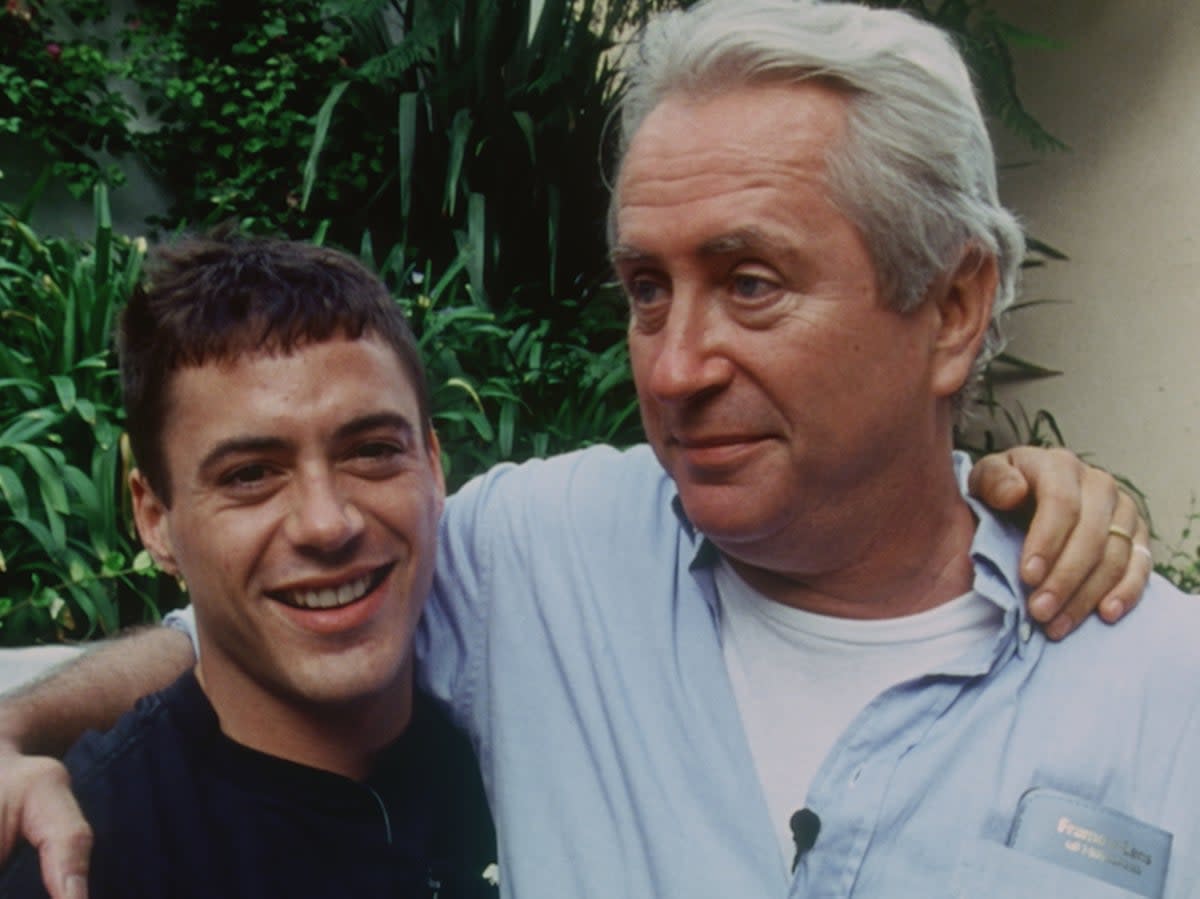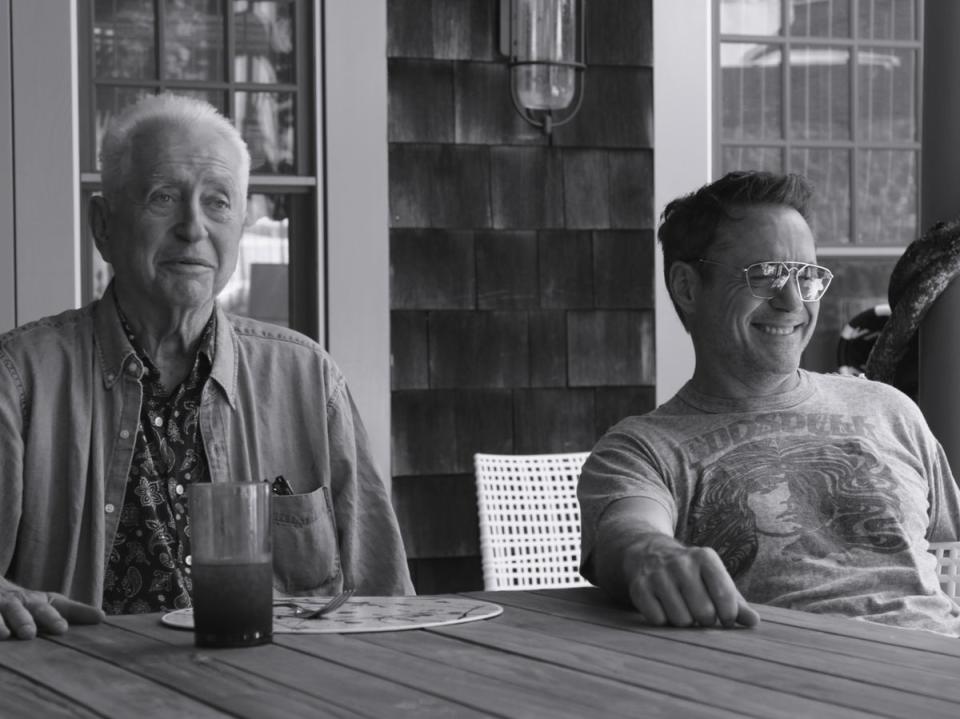‘We can’t paint a rosy picture’: Robert Downey Sr’s life of drugs, taboo-busting films and parental regrets

It’s almost weird that there aren’t more documentaries about Robert Downey Jr. There’s a very good case for the Iron Man actor being the biggest movie star on the planet for the past decade. For all the opinion pieces you see about the “death of the A-lister”, Downey Jr is just about as big-time as it gets: a performer whose seemingly effortless onscreen charm made him a star twice over. By 2018, he was reportedly making as much as $75m (£61m) for a single Marvel movie. But dive into his past, and it’s not so rosy: pain; addiction; a career on the brink of total annihilation. So when filmmaker Chris Smith approached him about making him the focus of a new documentary, it surely seemed like a slam dunk. “Word came back, around two weeks later – ‘Absolutely not’. No interest,” Smith recalls. “But he thought somebody should film his dad.”
Of course, Robert Downey Sr isn’t just “his dad”. Senior was an artist, a radically singular underground filmmaker best known for his 1969 satire Putney Swope. In 2016, Swope – which follows a Black advertising executive who is made the unlikely boss of a Madison Avenue agency – was selected for preservation by the Library of Congress for being “culturally, historically, or aesthetically significant”. Other films of his include Chafed Elbows (about a man having an affair with his mother), Greaser’s Palace (an “acid Western” spoofing the life of Jesus), and Too Much Sun (a subversive comedy in which a father bequeaths his inheritance to whichever of his two gay and lesbian children first produces a grandchild).
Though his films have been championed by a few prominent industry figures, including the director Paul Thomas Anderson, and many of them feature early performances by his son, Downey Sr’s oeuvre remains little seen among the wider public. Smith’s documentary “Sr.”, released on Netflix this week, may start the process of changing that.
“Sr.” includes parts that you might find in any career retrospective documentary: short clips from Downey Sr’s films; talking heads (including Little Miss Sunshine actor Alan Arkin and Emmy-winning screenwriter Norman Lear); a generous splashing of biographical detail, from his insubordinate time in the military to his role in the wider 1960s counterculture. But Smith, who previously directed Netflix’s Jim and Andy, about the making of Jim Carrey’s Man on the Moon, was also given extensive access to the Downeys, and most of the film comprises footage taken with Downey Sr in his twilight years.
Partway through production, Downey Sr began simultaneously compiling his own (considerably more avant-garde) cut of the documentary – we are shown, too, excerpts from this. But it was also midway through production that both Smith and the Downeys realised they were making a different film from the one they had set out to make. “The movie started out just as a portrait of an artist – of a maverick filmmaker from the late Sixties and Seventies,” Smith says. “And then, as we started spending more time with Senior, things changed.” What changed, of course, was Downey Sr’s health.
He was sick, with Parkinson’s disease, and was only getting worse. The camera stuck with him. As it progresses, “Sr.” becomes a document of old age, of physical decline, and of the myriad complicated feelings that accompany that. “One of the [consequences of this] is Robert Downey Jr ended up becoming a much bigger part of the film,” Smith explains. “The movie changed from being about looking at a filmmaker in his career to looking at the relationship between a father and a son.” On 7 July 2021, Robert Downey Sr died.
Though the film generally shows a harmonious, loving dynamic between the two personalities, Downey Jr understates the matter when he describes his father’s relationship with him as “complicated”. The elder Downey had always allowed his son into all aspects of his life, particularly filmmaking. During RDJ’s infancy, his cot was kept in the editing room while his parents – Downey Sr and his first wife, the actor Elsie Ann Ford – would go through the dailies at night. RDJ made his screen debut at the age of five in his dad’s 1970 film Pound, a bizarre comedy in which human actors play a kennel full of dogs awaiting euthanasia.
It’s fair to assume that Downey Jr’s constant and total exposure to filmmaking from such a young age helped to make him the movie star he became. But outside of work, Senior’s boundary-free approach to parenting was far more harmful. He was in the throes of addiction (chiefly to cocaine and marijuana), and allowed his son to take drugs with him from the age of six. Downey Jr has now been sober for nearly two decades, but his highly public struggles with addiction nearly cost him his career, and his life.
“Many times during interviews with Robert [Jr], he’ll be very clear that we can’t say that everything worked out great,” Smith recalls. “We have to acknowledge that, and we can’t paint too rosy a picture. I think he still had issues that he wanted to bring up with his father, but at the same time, there’s the reality of what’s unfolding [with his health]. You have to take that into consideration, too. So it was a balance between those two things.”
There are complex shades of light and dark to Downey Sr. The film takes pains to highlight the compassion and dedication he showed when his second wife, Laura Ernst, was suffering from the degenerative condition Lou Gehrig’s disease (she died in 1994). His relationship with his son towards the end of his life – and with his grandchildren – is one of care and closeness. Anyone who has ever had to visit an ailing elderly relative in care will likely find some of the film’s footage extremely relatable.

The documentary follows Downey Sr right up to the very end of his life, to the point where he is shown no longer recognising his son’s face. “The last sequence, in which Robert wanted to have a moment with his dad, you’ll see in the movie,” says Smith. “Robert didn’t know that [cinematographer/editor Kevin Ford] put an iPhone in the corner. When you see the movie, it’s invaluable footage. I don’t think he was looking at that interaction as a scene, it was more something that he was just doing for himself.”
There is a certain strangeness to Downey Jr’s eventual success in the Hollywood mainstream; his father was a perennial outsider, idiosyncratic and anti-commercial to the core. (His one attempt at a more mainstream studio comedy, 1980 military satire Up the Academy, proved a frustrating experience for Senior, who later described it as “one of the worst f***ing things in history”.) His son, meanwhile, has literally become as mainstream as it gets.
But curiously, this divide didn’t seem to be a source of tension. “I definitely think there were films that [Downey Sr] didn’t care for,” Smith says. “And I think, as Robert would openly admit, his dad wouldn’t hide his disdain if there was something he didn’t like. But, you know, when we asked him about the Marvel movies – about Iron Man in particular – I remember he loved it. He was like, ‘You have a guy who wants to give up his weapons!’ I think he was really proud, to be honest, seeing Robert’s success.” As is evident in “Sr.”, the pride flows both ways.
If Netflix can get even a small fraction of Downey Jr’s fans interested in films like Putney Swope, it’ll be a win for independent cinema, and for an artist whose work has long proved too strange and uncompromising for most traditional plaudits. “I think when people saw what Robert Downey Sr was doing, it allowed them to look at cinema differently,” says Smith. “It might not manifest itself in trying to emulate his movies, but it evolved the creative process. I think that’s undeniable.”
‘Sr.’ is streaming on Netflix now

 Yahoo Movies
Yahoo Movies 
